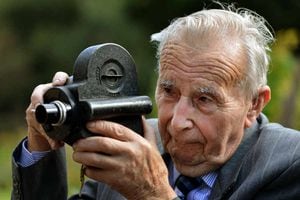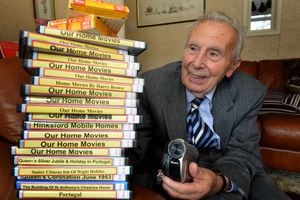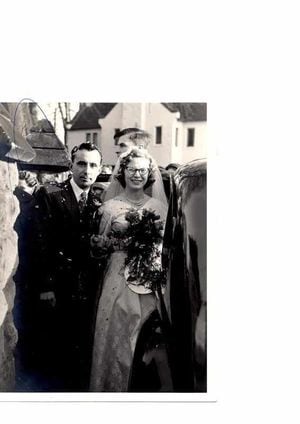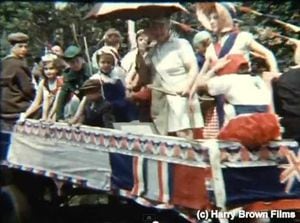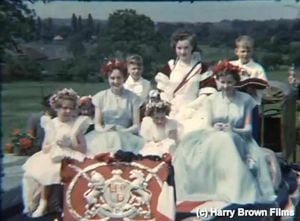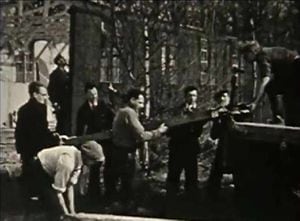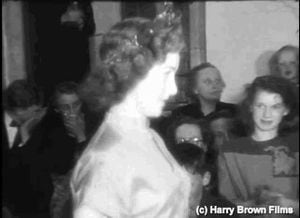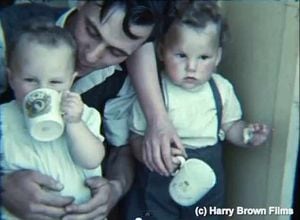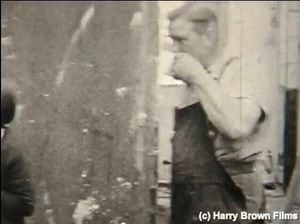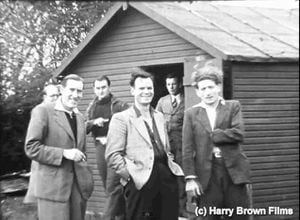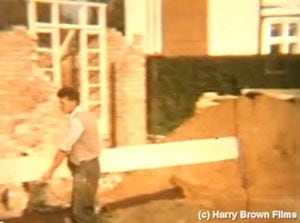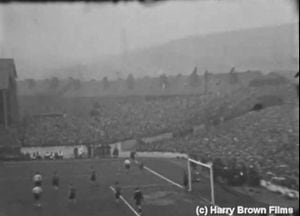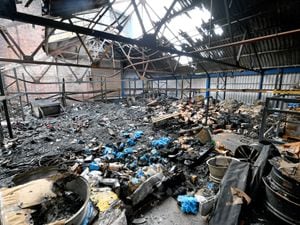Harry lives life through a lens – 70 years of Midlands history on film
When Harry Brown first picked up a cine camera in the 1940s, little did he know it would spark a lifelong love of film that would see him document a comprehensive social history dating back more than 70 years.
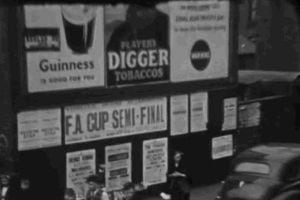
Mr Brown, now 89, joined the Wulfrun Cine Club in 1950 purely as a way to socialise and meet new people.
While he often visited the Penn Cinema – his favourite film of the time being 1940's South of Pago Pago – he had no interest in becoming a big film director.
But once he began capturing life around him in Lower Penn, Wolverhampton, he quickly caught the film bug, which has never left him.
He said: "I didn't like going into pubs drinking and I have never smoked, so I got involved in my work as a way to socialise.
"I enjoyed capturing people – that was my interest."
Mr Brown was born in 1924 in Langley Road, Lower Penn, the son of an agricultural worker.
He went to Woodfield Avenue Infant and Junior School and then moved onto Mount Road Senior School.
He qualified for the local grammar school at 15 but turned down the offer so that he could work on his family's fields behind his house on Langley Road.
He says being self-employed helped when it came to his twin passions of filming and community work – allowing him to take a break from work if a vital project came up.
He met his wife Anne, now 80, in 1955 at a dance at Lower Penn's Victory Hall for which he was selling tickets, and the couple got married on December 21, 1957.
The couple will celebrate 57 years of marriage this year – although there were disagreements over the the huge amount of money he used to spend on film equipment.
With three children, Helen now 55, Jon, 52, and Alison, 49 to look after Mr Brown was not afraid to invest in his beloved hobby over the years.
One piece of equipment he bought to record commentary directly onto film, cost him £350 in 1960, or just over £6,000 in today's currency.
By comparison, the family house cost £2,000.
To support his income, Harry used the equipment to travel the country and show films to various groups.
He made a series of road safety videos for children, which he lists as some of his most important community work.
His daughter Helen remembers the rest of the family being less than impressed with his spending.
"Mom used to go mad," she said. "It's worthless today, of course," Mr Brown added.
Looking back on his collection of short films, now transferred to DVD, even Mrs Brown admits that they're worth every penny.
"There's nothing like them," she says.
Mr Brown's footage includes recordings of his house on Langley Road being built back in 1957, when he climbed up ladders to film the men working on the roof, and even convinced the builders to put in a special projector window in the living room.
Without today's stringent health and safety rules the men are pictured atop ladders and the roof finishing the chimney, all of them working without hard hats or any safety equipment.
His avid interest in film and local events has meant that almost everything that has happened in Lower Penn has been captured on video.
He has collected thousands of hours worth of footage set both in Lower Penn and on trips abroad. Not family videos in the traditional sense, he instead focused on the people around him and on the events in their life.
Mr Brown's membership to the International Pen Friends meant that holidays were generally about meeting those he had been writing to in other countries.
It was also a chance to film in some new locations, and the family has footage of their vacations from around the world.
A holiday film set in Portugal shows life on a harbour in 1950s Lagos. The film follows women gutting fish, old men checking lobster traps and young children fighting in the street.
While Mr Brown didn't enjoy pub culture, he certainly loves the Wolves: "I remember my first game was the cup final against Portsmouth in 1939," he said.
The 4-1 defeat wasn't enough to put him off, and he's had a season ticket at the Molineux since 1945.
Even today he has a series of taxi drivers on standby to help him with his scooter at every match, and among his collection has footage of Wolverhampton Wanderers dating back to the 50s.
He filmed parts of the 1951 semi-final against Newcastle United, capturing scenes of the crowds flocking through the streets of Wolverhampton as well as the action on the pitch.
Sadly the Wolves eventually lost the match, Newcastle beating them 2-1 in the replay.
It is these local videos that get the most attention. He has recordings from as early as the 1940s, and has captured countless events since.
From children playing in the heavy snows of 1947 through to events at the Millennium, his unique archive of footage shows how people in the area lived, worked and celebrated over a period spanning more than 70 years.
Now, watching his older videos, the family can point out children on film that are now in their 70s.
Amongst the most memorable of his recordings are the Coronation celebrations in the village in 1953, which include footage of a beauty pageant to name Lower Penn's Coronation Queen and the winner of the best decorated house award.
Mr Brown participated in the building of Lower Penn's Victory Hall, where he went on to meet his wife less than five years later, and filmed also the construction
When the BBC shot a documentary about village halls for its One Foot in the Past series, the director was desperate to see Mr Brown's film showing the building work.
The footage went on to be used in the television show and he even got to see his name in the end credits.
He remains modest: "I don't know that I'd say I'm an authority.
"I just took an interest, that's all."
As well as documenting the lives of those in Lower Penn, Mr Brown has been at the very heart of life in the area.
On top of his involvement with the parish council, of which he has been a member for more than 50 years in total, he was made treasurer of the Lower Penn Over-60s Club in 1954 – and has stayed in the position ever since. While the club itself was purely for older people, he was allowed to be involved in the planning side and has spent years involved in organising events for the group.
He was given a certificate in the 1980s when he was finally allowed to join as a fully-fledged member of the club.
Nowadays, despite battling bladder cancer and having a few falls, Mr Brown, a grandfather of four and great grandfather of one, still has an interest in filming.
He has invested in a digital camera now, although he still prefers cutting and splicing film over dragging and dropping scenes on the computer as the majority of film makers do thesedays. Daughter Helen says: "I remember him sitting at the kitchen table, splicing for hours and hours into the night.
"He'd sit there until he got it perfect," she added.
Despite approaching his 90th birthday Mr Brown is still continuing with his work in the community, happy to carry on in his role as treasurer for the over-60s club.
In his spare time he grows flowers and makes hanging baskets, which he sells from his home in Langley Road, two doors down from where he was born.
He said: "I'm going to keep going till I drop."
Helen agrees: "I'm convinced he's right. Dad needs to be able to do something – he can't just sit around," she adds of her father. "He thinks about people."
Helen is continuing the family legacy of documenting life in Lower Penn. With Mr Brown's film becoming increasingly delicate after decades in storage, Helen started digitizing the film. Transferred to her computer, she's able to upload it to the internet or transfer it to DVD, where dust and age are less of a worry
She is currently uploading her father's footage to video sharing website YouTube, and posts it to a website she writes on the history of the local area, which can be found at lower-penn.co.uk
The videos are now reaching a whole new audience of nostalgic internet users who are impressed by the lack of safety helmets on the building sites and footage of old Wolves matches.
She says she doesn't want to touch up the footage or clean the film.
"I was always taught not to mess with history," she says.
Click here to see more of Harry's films
